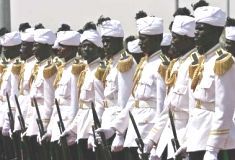Arab summit troubled by absence of key players, tricky issues
Mar 27, 2006 (KHARTOUM) — The Sudanese president welcomed Arab heads of state Monday for a summit this week, but some major leaders were avoiding the gathering, which is to deal with Iraq, Hamas and others of the Mideast’s toughest problems.
 A 50-member Sudanese honor guard, dressed in white jackets and turbans topped with black feathers, stood stiffly alongside President Omar al-Bashir by a red carpet as the leaders descended from their planes and walked with their host to the VIP section of the airport.
A 50-member Sudanese honor guard, dressed in white jackets and turbans topped with black feathers, stood stiffly alongside President Omar al-Bashir by a red carpet as the leaders descended from their planes and walked with their host to the VIP section of the airport.
But regional heavyweights Egyptian President Hosni Mubarak and Saudi King Abdullah do not plan to attend. At least five other heads of state from the Arab League’s 22 members sent other delegates to represent them in the Tuesday-Wednesday meetings.
Some cited security concerns — there are worries that Sudan would not be able to enforce strict enough standards to protect such a large number of VIPs — and others, like Iraqi President Jalal Talabani, had domestic issues to attend to at home.
Lebanon was in effect sending two delegations — that of pro-Syrian President Emile Lahoud and another led by Prime Minister Fuad Saniora, who heads a government dominated by opponents of Damascus who want Lahoud to step down.
Saniora decided at the last minute to attend, saying that Lahoud’s presence “amounts to an absence of Lebanese representation.”
Foreign ministers have already agreed on draft resolutions that will be discussed by the heads of state, on the key issues of Iraq, the new Hamas-led government in the Palestinian territories, the Iranian nuclear issue and Sudan’s Darfur crisis.
The draft resolution on Iraq pledged that Arab countries will open diplomatic missions there as a gesture of support and help in the country’s reconstruction. The final draft came after harsh criticism by Iraq’s foreign minister that fellow Arabs are not doing enough to help his wartorn nation.
The question of Arab ambassadors is a sore point. Since the 2003 U.S.-led invasion of Iraq, Arab diplomatic missions have been operating with lower-level staff, with government reluctant to send ambassadors. Last year, Arab League members promised to begin sending ambassadors to Baghdad, but the initiative ground to a halt after a top Egyptian diplomat and two Algerian diplomats were kidnapped and killed by insurgents last July.
The draft resolution also reflected Arab countries’ fears that planned U.S.-Iran dialogue means their interests will be squeezed out of key discussions on Iraq’s future.
The statement emphasized “the Arab role in any consultations about Iraq’s future and enhancing the role of the Arab League in achieving Iraq’s national reconciliation.”
The Arab summit comes as Iraq’s Shiite, Kurdish and Sunni parties are caught in a three-month stalemate over forming a new government following Dec. 15 parliament elections.
Another key resolution promises that Arabs will continue funding the Palestinian Authority despite U.S. calls for a halt of financial aid to a government led by the radical Hamas group.
But there was little sign that the Arab League would move to ensure its member states follow through with the pledges, which have gone largely unfulfilled in the past.
The summit’s resolution will also underline Arab nations’ commitment to a 2002 Arab League peace initiative, which offered Israel full recognition in exchange for full withdrawal from Arab lands.
The league ignored calls by Hamas to increase aid dramatically, maintaining its promise of $55 million a month to the Palestinians.
Hamas is not represented at the summit, as its government has not yet been sworn in. The Palestinian delegation is led by President Mahmoud Abbas, who arrived Monday. Abbas maintains his position as president of the Palestinian Authority even after the Hamas government on Wednesday replaces the one dominated by his Fatah party.
Also among those who arrived Monday were the leaders of Kuwait, Syria, Lebanon and Algeria.
Libyan leader Muammar Gadhafi, a dynamic stand-out at most Arab gatherings, arrived Sunday, a day before his official delegation, surprising Secretary-General Amr Moussa, who rushed out of a ministers’ meeting to greet him.
(ST/AP)
